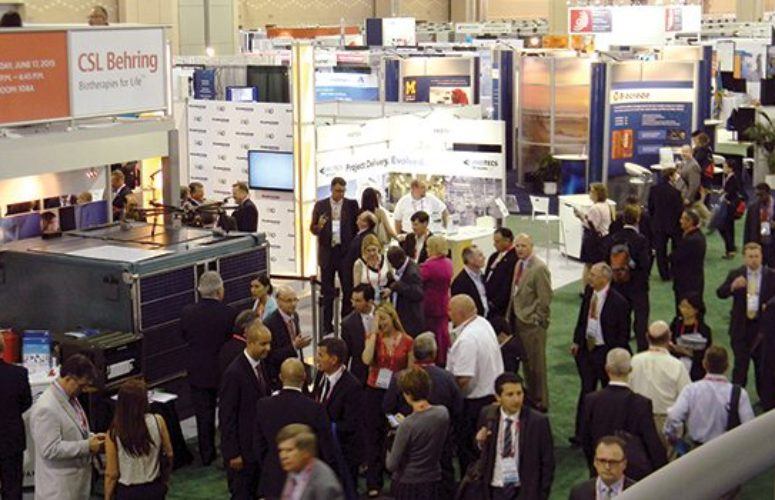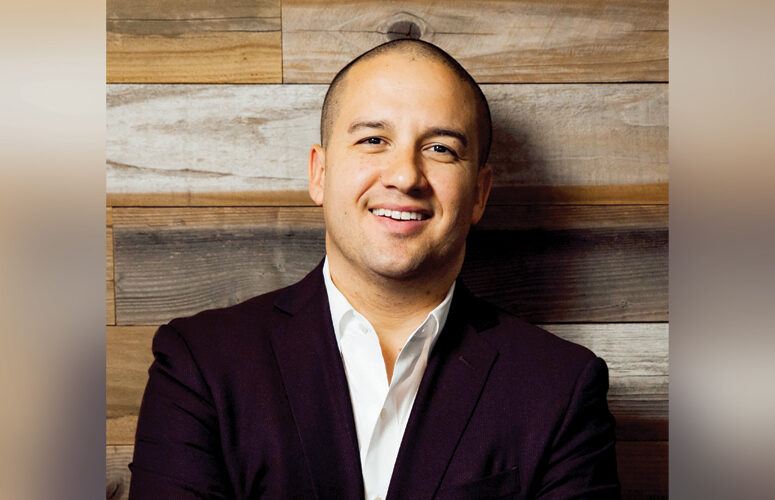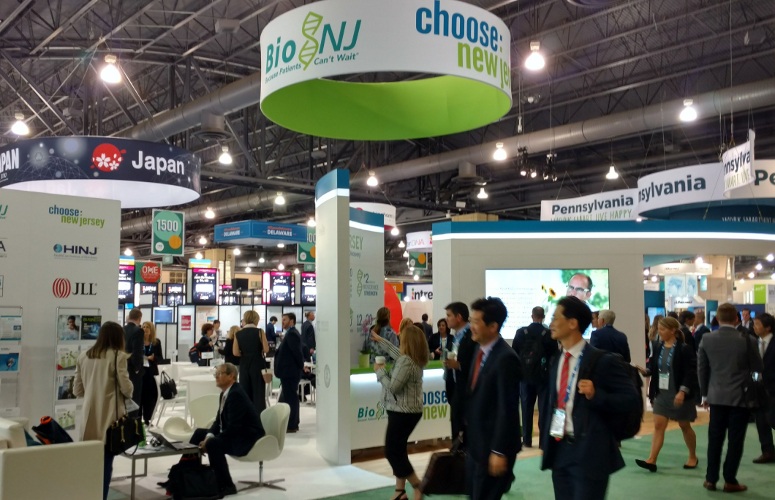
State’s Life Sciences Industry Makes its Mark at 2015 BIO International
New Jersey delegation markets New Jersey’s prowess at global industry convention.
By Anthony Birritteri, Editor-in-Chief On Aug 3, 2015New Jersey pulled out all the stops in attracting the international biotech community at the recent 2015 BIO International Convention in Philadelphia. The event drew 15,858 industry leaders from 69 countries and 47 states, and the New Jersey delegation spent the three-day event in June discussing the many benefits of growing and attracting a business to the Garden State for this global audience.
Whether attracting companies to its 30’x50’ NJ Pavilion on the Pennsylvania Convention Center’s trade show floor or hosting an evening Prospect Dinner, the message was that New Jersey has the economic incentives, the skilled high-tech workers, the institutions of higher education, the professional support services, the transportation systems and the real estate locations that all life sciences firms need to be successful.
Lt. Governor Kim Guadagno told New Jersey Business that the real “bread and butter” of the event was the Prospect Dinner, when the state’s delegation, including the New Jersey Partnership for Action members Choose NJ, the Economic Development Authority and the Business Action Center, plus leaders from higher education, real estate and the like, hosted some 70 companies. These prospects were selected via leads generated by Choose NJ and partners through past trade missions. The goal was to educate them on what New Jersey has to offer their companies.
When asked how her message to these companies differed from prior BIO International events, Guadagno responded, “New Jersey is now even a better place to locate a life sciences business because of the new Angel Investor Tax Credit program, the doubling of the R&D tax credit and the passage of the Economic Opportunity Act with its Grow NJ program, which allows smaller companies [in certain industries] to qualify for tax incentives.
“The message is that we now have the financial incentives that every young company needs,” Guadagno said.
Discussing the importance of higher education to the life sciences industry, Christopher Molloy, Ph.D., R.Ph., senior vice president for research and economic development at Rutgers University, said the main role of the state’s colleges and universities is creating the employees for these companies. “The fact is that schools like Rutgers, Rowan and Princeton, etc., have the graduates with the scientific and business skills that the industry wants to have.”
Molloy added the state needs to strengthen its angel investor and venture capital ecosystem for the life sciences and other high-tech industries. “I think the biotech hubs in Boston and California have drawn some of that away, and we are challenged to get those networks [venture capital firms] to look at what is going on in New Jersey. The attraction of venture capital has been under-marketed,” he said.
In the midst of this funding decrease, BioNJ President Debbie Hart commented that state government, from the Whitman Administration to the present, has been “very supportive of the industry. With just 80 biotech companies in New Jersey in 1998, there are more than 380 today. We believe the growth will continue,” Hart said.
Many of the large pharmaceutical companies that call New Jersey home, such as Johnson & Johnson and Merck, were present at the convention with their own large pavilions. However, many smaller life sciences firms were present as well. Though many did not have booth displays, they were nonetheless making the rounds of the 150,000-square-foot showroom floor, looking for opportunities to collaborate with their peers.
One company was Newark-based Symbiomix Therapeutics, a biotech firm that is developing medicines for women’s health infections, such as SYM-1219, an antibiotic for bacterial vaginosis (BV). A form of the drug has been for sale overseas, but Symbiomix saw the opportunity to bring it to the US as a single dose oral medication, a much better regimen than the typical seven-day treatment.
SYM-1219 has gone through FDA phase 1 and 2 clinical trials and is in the middle of a phase 3 confirmatory process. According to President Robert Jacks, the company hopes to file a New Drug Application with the FDA by mid-2016. SYM-1219 has also received Qualified Infectious Disease Product (QIDP) status from the FDA, which is awarded to drugs that treat life threatening infections. BV infection, Jacks said, increases the risks for HIV infections, pre-term births and gynecological surgeries.
The company has raised a total of $41 million in financing. This money has carried Symbiomix through its clinical trial phases, but the company is now looking to raise capital to launch and commercialize the drug.
Asked why he is at BIO International, Jacks responded, “Since we have received QIDP status, we have been receiving a lot of strategic interest from companies wanting to explore partnerships. So, we are here to talk to those companies.”
South Plainfield-based PTC Therapeutics, which was founded by current BioNJ chair Stuart Peltz, focuses on the discovery, development and commercialization of therapies to treat rare infectious diseases via Ribonucleic acid (RNA) biology. Its lead drug is Translarna, which is now being used in Europe to fight Duchenne muscular dystrophy (DMD). In the US, the drug is undergoing phase 3 clinical trials, and Shane Kovacs, chief financial officer for the company, said that if all goes well, the drug should be on the market by the first half of next year.
Translarna sales in Europe this past first quarter reached the single-digit, million-dollar range, according to Kovacs. Potential global sales of the drug are $1 billion for the treatment of DMD. Translarna is an orphan drug, since DMD impacts some 2,000 young males in the US. These children have a short life span, with victims usually dying in their 20s. According to Kovacs, the drug is the first product to treat the underlying causes of the disease.
PTC went public two years ago, raising $144 million in gross proceeds, according to Kovacs. With other private placements and financing, the company has raised more than $450 million. It currently employs 250 people in South Plainfield and hopes to expand to 400 employees by the end of the year. For that reason alone, it is looking for a larger facility close to its home base.
Kovacs said PTC is attending BIO International because it is looking for other companies or technologies that it can “bring in to supplement what we are doing internally with external assets.”
Many other New Jersey-based life sciences companies were at BIO International networking with potential partners. Some of them included Somerset-based Catalent, Fairfield-based SGS Life Sciences Services and Ewing-based Celator Pharmaceuticals.
According to Dean Paranicas, president of the Healthcare Institute of New Jersey (HINJ), these and other companies, in addition to the higher education community present at BIO International displayed the “great vitality and robustness of the state’s life sciences community.”
BioNJ’s Hart added, “We want to make sure the world knows that New Jersey’s life sciences industry is open for business.”
Related Articles:






